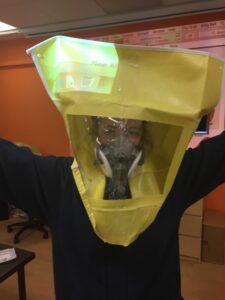Why is Stonemasonry harmful for your health?
Working in a profession such as stonemasonry can be harmful to your health if you're not wearing appropriate, well-fitting equipment such as a respirator. Stonemasonry can produce airborne respirable crystalline silica (RCS). Natural substances such as sand, rocks and clay contain silica. Also, found in products such as bricks and concrete. When cut, sanded, or carved, these materials create a very fine dust, invisible under normal lightening. As a result of these particles getting trapped in your lung tissue, inflammation and scarring occur. Silica exposes an estimated 600,000 workers in the UK each year.
You need to be extra careful as it's not just specific activities such as drilling or cutting materials that can leave you exposed. The dust can also:
- Stay in the air
- Released from clothes or surfaces
- Get airborne again when disturbed by people or vehicles
- Released when equipment leaks or there's a spillage.
That's why respirators for stonemasons are essential.
The particles also reduce the lungs’ ability to take in oxygen, resulting in silicosis. Typically, silicosis is a long-term lung disease caused by inhaling large amounts of crystalline silica dust. Silicosis can cause severe breathing problems and increases the risk of lung infections.
It is the employer's responsibility to ensure their workers are supplied with “fit tested” respiratory protective equipment as it is a legal requirement.
A company in Accrington, pleaded guilty to breaching section 2(1) of the Health and Safety at Work etc. Act 1974. Section 2 (1) of HSWA states: “It shall be the duty of every employer to ensure, so far as is reasonably practicable, the health, safety and welfare at work of all his employees.”
The company were fined £8,000 and ordered to pay costs of £10,000. Companies should know HSE will not hesitate to act against those failing to protect their workers’ health.
Extra precautions Stonemasons should take
Following the COSHH controls, you should:
- Always confirm the extraction system is turned on and working before starting.
- Ensure your RPE works properly every time they put it on.
- Workers should stand to the side of a cross-draught booth, not in the airflow.
- Ensure the dust jet is directed towards the extractor.
- Clean air pre-filters daily or follow the manufacturer’s advice.
- Shake down air filters regularly (e.g., every hour), or use automated reverse-jet cleaning.
- Ensure you can get spares easily.
What are the requirements?
Before your fit test there are a few requirements you must follow. You must:
- Not eat or drink within 30 minutes of the fit test (excluding unflavoured water)
- Not chew gum, smoke, or vape within 30 minutes of the fit test
- Bring some form of photographic ID with you
- Ensure the mask seal area has been clean shaven within the last 8 hours
- Remove any makeup within the mask seal and have long hair tied back
- Bring any head worn personal protective equipment that you wear with your mask
- Bring glasses if you wear them with your mask.
8 hours before your fit test, you and your workers must be clean shaven. For a tight-fitting respirator to perform effectively and protect the wearer from breathing in hazardous substances, they reply on a tight seal to the wearers face. For more information on facial hair guidelines for face fit testing, please click here.
A fit test certificate is valid for 2 years however if any of the changes below are made, you will need another fit test to ensure the highest level of protection for yourself.
- Loose or gain weight that alters your face shape
- Have substantial dental work
- Have any changes in head-worn personal protective equipment (PPE)
- Have any new facial piercings
Fit Testing with Cavity
A face fit test is a simple and quick procedure that can prevent many health issues and possible fines to your business. We can come to your premises to carry out yours and your teams fit test. We also are able to perform fit tests at our head office in Wokingham. You’ll need to bring the mask you’re currently using or going to use. A risk assessment to determine what type of mask and the level of protection you'll need. This should be carried out by your employer.
also are able to perform fit tests at our head office in Wokingham. You’ll need to bring the mask you’re currently using or going to use. A risk assessment to determine what type of mask and the level of protection you'll need. This should be carried out by your employer.
Qualitative Fit Testing Method
Qualitative fit testing is a pass/fail test based on the wearer’s subjective assessment of any leakage through the face seal region by detecting the introduction of bitter – or sweet-tasting aerosol as the test agent. QLFT methods are suitable for disposable and reusable half masks, they are not suitable for full-face mask. At Cavity, we offer a fit test service for FFP3, FFP2, and FFP1 masks.
Quantitative Fit Testing Method
Quantitative fit testing is the process to measure the precise amount of leakage into any tight-fitting facepieces. Instead of relying on bitter-tasting chemicals and your senses, the test is performed by a machine (Porta Count) calculating the measurements. The reading on the porta count machine will determine if the mask has an adequate seal with the wearer’s face.
Within our team, we have several Fit2Fit accredited fit testers with experience in face fit testing. Our methods have been checked and confirmed with the best practice for face fit testing in line with BSIF and HSE. Good knowledge and technique are essential when conducting a fit test, poor execution could result in workers being exposed to dangerous hazardous substances.
Choosing the correct respirator for Stonemasons
There are three different levels of Filtering Face Pieces (FFP): FFP1, FFP2, FFP3.
FFP1
FFP1 are designed to filter at least 80% of particles that are 0.3microns in diameter or larger.
FFP2
FFP2 are designed to filter at least 94% of particles
FFP3
FFP3 are designed to filter at least 99% of particles. An FFP3 mask is suitable for use whilst dealing with building materials such as asbestos. FFP3 provides the greatest level of protection. Therefore, a FFP3 mask would be the most appropriate respirator for a stonemason.
For more information you can visit our website www.cavity-fit-test.co.uk, email us on enquiries@cavity-fit-test.co.uk or call us and speak to Lisa on 0118 4023795 or Sarah on 0118 9079875 who will gladly assist you.
